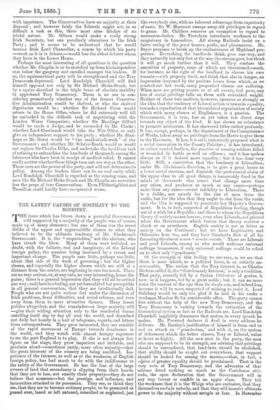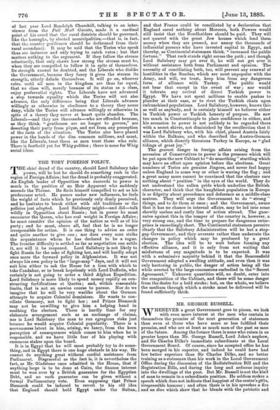THE LATENT CAUSES OF HOSTILITY TO THE MINISTRY.
THE force which has blown down a powerful Government still supported by a majority of the people was, of course, made up of many elements ; but one of them was the secret dislike of the upper and upper-middle classes to what they believed to be the ultimate tendency of Mr. Gladstone's Government. It is the " respectables," not the electors, who have struck the blow. Many of them were irritated, no doubt, with the failures, real and imaginary, of the Liberal foreign policy, the number being increased by a recent and important change. The people care little, perhaps too little, about that side of the work of governing ; but the higher classes, and especially the higher classes which are still at a distance from the centre, are beginning to care too much. There are no very serious, or, at any rate, no very interesting, home disputes ; there is a general impression that they will all be settled one way ; and there is a feeling, not yet formulated but perceptible in all general conversation, that they are intellectually dull. People who are not quite serious fret under the discussion of Irish problems, fiscal difficulties, and social reforms, and turn away from them to more attractive themes. Many desert politics altogether, and the remainder—a large majority still —give their willing attention only to the wonderful drama unrolling itself day by day all over the world, and described not daily but hourly in a hail of telegrams, reports, and letters from correspondents. They grow interested, they are sensible of the rapid movement of Europe towards dominance in the world, and they watch with almost hungry eagerness to see the part England is to play. If she is not always first figure on the stage, they grow impatient and irritable, and proclaim aloud—sometimes justly, more often unjustly—that the great interests of the country are being sacrificed. Impatience of the fairness, as well as of the weakness, of English foreign policy, has had much to do with the indifference to the safety of the Government. So has the fear of the large owners of land that ascendancy is slipping from their hands, that they are to lose, not exactly their property—they do not believe that nonsense—but the prestige, and influence, and immunities attached to its possession. They see, or think they see, that they are to become ordinary people, to be promoted or passed over, taxed or left untaxed, consulted or neglected, just like everybody else, with no inherent advantage from superiority of caste. Sir W. Harcourt sweeps away old privileges in regard to game. Mr. Childers removes an exemption in regard to succession-duties. Mr. Trevelyan introduces workmen to the magistracy in Lancashire. All strong Radicals insist on a fairer rating of the great houses, parks, and pleasaunces. Mr. Bryce proposes to break up the exclusiveness of Highland properties. Everything, the landlords think, goes one way, and they naturally not only fret at the way the stream goes, but think it will go much further than it will. They confuse the amenities of property, some of which are threatened—such, for instance, as the right of the landlord to choose his own tenants—with property itself, and think that also in danger, an impression deepened by the positive losses from which, as we pointed out last week, many propertied classes are suffering. When men are getting poorer, or at all events, feel poor, any loss of social privilege falls on them with redoubled weight. Neither of these two motives, however, operates so strongly as the idea that the tendency of Liberal action is towards equality, towards a repudiation of that hierarchical organisation of society which with many classes of Englishmen is a passion. The Government, it is true, has as yet taken few direct stops towards any object of the kind. It has shown no reluctance to promote aristocrats. It has showered titles rather profusely. It has, except, perhaps, in the department of the Commissioner of Works, taken away no privileges from the Haves to give them to the Havenots. It has, it is said, tentatively proposed what is a social innovation in the County Palatine ; it has introduced, or rather carried further, the practice of naming soldiers killed or wounded in battle as well as officers ; and it has spoken always as if it desired more equality ; but it has done very little. Still, a conviction that the tendency of Liberalism, under Mr. Gladstone's direction, is to give a great heave to a lower social stratum, and diminish the preferential claim of the upper class to all good things, is immovably fixed in the minds of thousands who resent that change more than any other, and produces as much as any cause—perhaps more than any cause—secret infidelity to Liberalism. There is a dislike, not merely for the rise of men from the ranks, but for the idea that they ought to rise from the ranks, and the idea is supposed to penetrate her Majesty's Government. It is, in fact, suspected of Republican feeling, though not of a wish for a Republic; and those to whom the Republican theory of society means loss are, even when Liberals, not grieved when the Government which fosters that theory receives a check or an overthrow. English society is not as bitter as society on the Continent ; but we have Legitimists and Orleanists here too, and they hate Gambetta first of all for favouring the rise of a new " couche sociale." There are Liberals and good Liberals, among us who would welcome universal suffrage to-morrow, if only universal suffrage could be relied on to elect only "gentlemen."
Of the strength of this feeling we are sure, as we are that there is none which, as a political force, is so entirely unreasonable. The notion that the Tory interest is, as Charles Dickens called it, the " Gentlemanly Interest," is only a tradition. That party, recently led by a Syrian litte'rateur of genius, is now, as it happens, led by a great noble ; but it can no more resist the current of the age than its rivals can, and indeed less,
because it will be more suspected of wishing to resist it. Lord Salisbury would be only too glad if he had in his ranks a workman Member fit for considerable office. The party cannot live without the help of the new Tory Democracy, and the Tory Democracy is rushing towards the extinction of the hierarchical system as fast as the Radicals are. Lord Randolph Churchill implicitly denounces that system in every speech he makes. Mr. Forwood declares it dead in every address he delivers. Mr. Bartley's justification of himself is from end to end an attack on " grandeeism," and with it, on the system of deferences which the better classes, Tory or Liberal, value at heart so highly. All the new men in the party, the men who are supposed to be its strength, are advising that privilege should be surrendered, that land-laws should be abolished, that ability should be sought out everywhere, that support
should be looked for among the masses,—that, in fact, a regime of greater equality should be proclaimed. That is the
very note of Tory Demooracy, and the advocates of that scheme dread nothing so much as the Coriolanus attitude, the open declaration that the Government will in any way favour or confide in an upper class. They tell the workmen that it is the Whigs who are exclusive, that they themselves exclude nobody, and that they will transfer ultimate power to the majority without scruple or fear. In November of last year Lord Randolph Churchill, talking to an interviewer from the Pall Mall Gazette, made it a cardinal point of his creed that the rural districts should be governed, like the boroughs, by elected municipalities,—that is, in fact, that the country gentlemen should be dethroned from their rural ascendancy. It may be said that the Tories who speak thus are insincere and only trying to catch votes ; but that matters nothing to the argument. If they follow the stream reluctantly, that only shows how strong the stream must be, when they are compelled to follow it in spite of themselves. Its strength cannot be doubted, and the Liberals who dislike the Government, because they fancy it gives the stream its strength, utterly delude themselves. It will go on, whoever rules, until all men in the kingdom are thus far equal, that no class will, merely because of its status as a class, enjoy preferential rights. The Liberals have not advanced a step towards equality which the Tories will not also advance, the only difference being that Liberals advance willingly or otherwise in obedience to a theory they never deny, while the Tories will advance willingly or otherwise in spite of a theory they never at heart quite abandon. The Liberals—and they are thousands—who are offended because, as they think, " gentlemen are no longer to govern," are deserting their party from pique, and not from any perception of the facts of the situation. The Tories also have placed power in the hands of the dim common millions, and must, like the Liberals, treat them as men treat those who rule. There is foothold yet for Whig politics ; there is none for Whig social ideas.



































 Previous page
Previous page